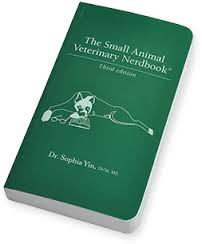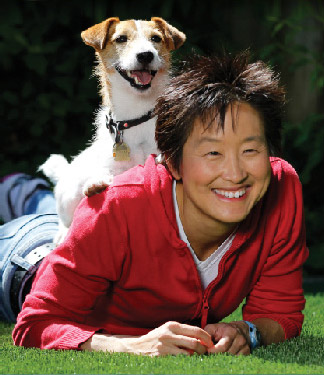When I was in school, I accumulated a lot of textbooks. Books from the titans, the Nelsons and the Feldmans and the Fossums. I stood in line at the bookstore with these heavy tomes weighing me down, and noticed every other person in line with a tiny mahogany text balanced on top of their piles.
“What’s that?” I asked.
“The Nerdbook,” they said. “I heard you can’t make it through vet school without it.”

They were right. I spent many hours in rounds with my Nerdbook balanced on my lap, trying to look up answers to questions before the clinican called on me. It was unlike any other book I ever owned: concise, easy to navigate, organized by clinical signs to be completely usable. I heard it was written by a veterinary student, which made sense because it was so perfect for the way we used it, but also made no sense because who had time to write a book in vet school?
“Some gunner student a few years back,” I was told. “She was brilliant.” The author? Sophia Yin.
It was the only book I brought to the teaching hospital each and every day, taking it with me the following year into clinical practice: highlighted, scribbed on, well-loved. One time, I made a diagnosis that my clinician, a man who had been in practice for 167 years, said was impossible. “How did you know to put that on your differential diagnosis list?” he asked, before telling me I would be an amazing internal medicine resident. “Oh you know,” I said, but the answer was it was in the Nerdbook. Dr. Yin told me. The Nerdbook was everything. My techs used to hide it from me sometimes just to watch me panic for a few minutes.
Dr. Yin’s name popped up again soon after I began work, this time as a behavior expert. When she got into practice, she again sensed a void: a need for reasoned, science-based behavior approaches that would keep pets in homes and out of shelters. It’s hard to imagine now, but in the early 2000’s behavior was held in lower regard than specialties like neurology or internal medicine, a fluffball elective. “Nothing in life is free”, the foundation of positive reward based training, was in its infancy. Alpha rolling was still the norm in many circles, and training programs based on shock collars were being franchised left and right.
She helped lay the groundwork for what we now view as the best science-based approach to training, one of the most fundamental paradigm changes in our field in the last decade. Dr. Yin became a world-renowned behavior expert and fierce advocate for positive training, an amazing communicator whose lectures were always overflowing into the halls by an audience who finally recognized that her advice, when passed onto clients, was saving lives.
Though she was often known as a dog behaviorist, I remember her most for a series of cat lectures I attended at Western around the time Apollo was marking in the house. My husband was about to lock him permanently in the garage. In one hour, she gave me enough actionable tips to fix the problem, for me, and later on for clients and blog readers. Those tips keep animals out of shelters and in homes.

Dr. Yin’s latest work is, again, revolutionary. As a board member for Dr. Marty Becker’s Fear Free Practice movement, she is one of the key figures teaching us low-stress restraint techniques that change the way we practice medicine. It makes sense, right? Why do we just accept the fact that pets hate the vet? Why do we not try to make it better? Just this week I used a technique of hers I watched on video to help bring a frightened cat out from under the bed; he was already ill and the last thing he needed was more terror. Dr. Yin’s reach and her influence is everywhere, her touch felt every day in the way we practice modern medicine with compassion.
Dr. Yin was the best of what veterinary medicine is all about, a passionate veterinarian, a dedicated revolutionary, a person whose accomplishments knew no bounds, an inspirer of colleagues. Her unexpected passing has left so many saddened; I hope her family and friends know just how much she was beloved by so many people. Thank you Dr. Yin for everything. You will be sorely missed.






Lovely tribute Dr. V…
I wasn’t familiar with her work, which surprises me. But what a lovely human being and champion for animals. And what a lovely tribute.
Beautiful. She shared her knowledge freely, which was so wonderful. I’ve used many of her “white papers” and infographics to explain things to readers. Rest in peace, Dr. Yin.
I’m just a regular, nonprofessional dog lady with a fear-reactive dog. The resources Dr. Yin made available on her website for free had a tremendous influence on our lives. I took Brewster to a positive-reinforcement obedience class, of course, but it was being able to access free information on her website that really changed how I relate to Brewster and therefore how Brewster relates to the world. Dr. Yin taught me things and gave me knowledge that no vet or dog trainer has the time to share in a 10-minute appointment or a class with ten other dogs. We are a happy, calm(ish) family thanks in large part to the generosity of Dr. Yin.
Dr. Yin was a guiding light for many. I hope she will continue to be. Still, she will be missed.
Wonderful tribute to Dr. Yin. I’ve seen her book brought out more than once when treating one of my cats. I know she will be missed, but her knowledge she has given to all her students will not be lost. Her written words will forever enlighten more students in the care of animals everywhere.
Amen. Thank you for sharing your own experience with her work and the impact she has made. She has changed so much for so many animals. I think I am going to ask my own vet if she uses her materials and videos because she demonstrates exactly what you and Dr. Yin advocate – fear-free handling.